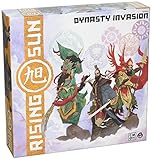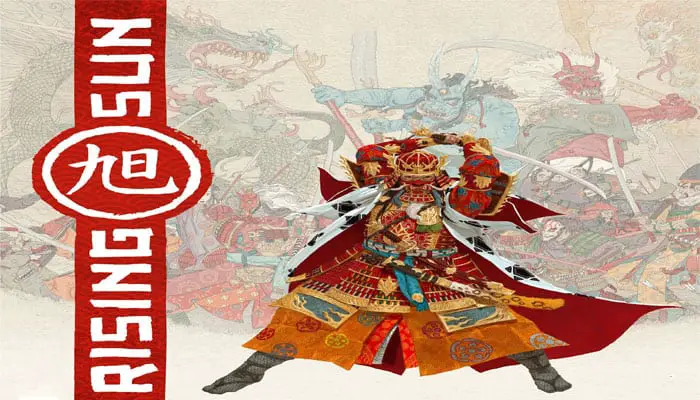
Components
- 1 Game Board
- 5 Clan Screens
- 7 Shrine Tiles
- 10 Political Mandate Tiles
- 21 Core Season Cards (7 per Season)
- 5 POLITICAL/WAR Tiles
- 24 War Province Tokens (8 per Season)
- 15 Teapot Set Season Cards (5 per Season)
- 15 Horseman Set Season Cards (5 per Season)
- 15 Archway Set Season Cards (5 per Season)
- 5 Alliance Tokens
- 20 Stronghold Tokens (4 per Clan)
- 20 Ronin Tokens
- 8 War Number Tokens
- 65 Plastic Coins
- 10 Clan Markers (2 per Clan)
- 10 Bonsai Clan Figures (6 Bushi, 3 Shinto, 1 Daimyo)
- 10 Koi Clan Figures (6 Bushi, 3 Shinto, 1 Daimyo)
- 10 Dragonfly Clan Figures (6 Bushi, 3 Shinto, 1 Daimyo)
- 10 Lotus Clan Figures (6 Bushi, 3 Shinto, 1 Daimyo)
- 5 Huge Monster Bases (1 per Clan)
- 10 Turtle Clan Figures (6 Bushi, 3 Shinto, 1 Daimyo)
- 15 Shinto White Bases
- 5 Daimyo Black Bases
- 15 Large Monster Bases (3 per Clan)
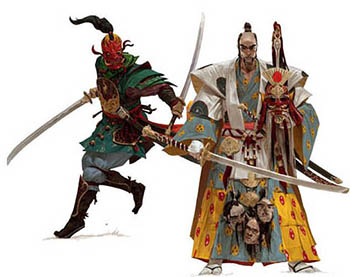
Object of the Game
Rising Sun is a board game for 3 to 5 players set in legendary feudal Japan.
Players compete to lead their Clans to victory by accumulating Victory Points over the course of the Seasons. Players will forge and break alliances, choose political actions, worship the gods, customize their clans, and position their figures around Japan.
Victory Points can be gained in several ways, from winning battles, to harvesting the right provinces, to playing to the Virtues accumulated by your Clan.
By the time Winter arrives, the player with the most points will rule the Land of the Rising Sun!
Setup
Prepare Your Clan
1 First, each player chooses one of the available Clans to play, by placing one of the Clan Screens in front of them and placing a POLITICAL/WAR tile behind it (with the Political side facing up).
All materials and figures for Clans that were not chosen are returned to the game box.
Sitting Order
It is important that players sit around the table in the right order, according to the Starting Honor Rank of the Clan they chose (as indicated on their Clan Screens) . The Clan with the lowest-numbered Starting Honor Rank will be the first to play . The Clan with the next Rank after that must sit to their left, and so on . So, as play will go in clockwise order, it will start from the Clan with the lowest-numbered Starting Honor Rank, and proceed in ascending order around the table . Note that the sitting order (and thus play order) stays the same throughout the game.
/Example : In a 5-player game, the sitting order going clockwise must be KOI , LOTUS , TURTLE , DRAGONFLY , and BONSAI.
2 Place 1 of your Clan markers on the first slot ( ) of the Victory Point Track on the board.
) of the Victory Point Track on the board.
3 Your other Clan marker is placed on the Honor Track . The slot on which it's placed depends on your Clan's Starting Honor Rank . The Clan with the lowest- numbered Rank goes on the top slot. Below it goes the Clan with the next Starting Honor Rank, and so on. There should be no empty slots between Clan markers, though there will be empty slots at the bottom, depending on the player count.
Example: In a 5-player game, the starting order on the Honor Track going from top to bottom would be KOI , LOTUS , TURTLE , DRAGONFLY , and BONSAI .
4 Take your clan's Daimyo figure, 3 Shinto figures, and 6 Bushi figures, and make sure a black plastic base is attached to the Daimyo and white bases to the Shinto to more easily identify them. Keep all of your figures next to your Clan Screen, in sight of the other players. This area is called your Reserve.
5 Take all the plastic bases in your Clan's color and keep them next to you.
They will be used if you acquire Monsters.
6 Take the 4 Stronghold tokens and the Alliance token belonging to your Clan and keep them next to you.
7 Home Province: Each player takes 1 Daimyo figure, 1 Bushi figure, and 1 Stronghold token and places them on the board, inside their Home Province (as indicated on their Clan Screen).

Prepare The Kami
8 Shuffle the 7 Shrine tiles facedown. Draw 4 Shrine tiles and place them faceup on the Shrine Slots on the board, from left to right. First-time players should use, in this order, Amaterasu, Fujin, Hachiman, and Tsukuyomi . The
remaining 3 Shrine tiles are returned to the game box.
Prepare The Season Decks
9 Take the Core Season cards and place them facedown next to the board, creating 3 separate decks: Spring, Summer, and Autumn.
Players should then decide which Set of Season Cards they will use in this game session. The Rising Sun core box offers 3 different Sets: Horseman, Archway, and Teapot, each bringing a different gameplay experience. First-time players should use the Archway Set . Players can also randomize the choice of Set by shuffling 1 card from each Set and drawing 1 . Once a Set is selected, take its 5 cards for each of the Seasons and add them to the Core Spring, Summer, and Autumn decks.
Each of the Season decks should then contain 12 cards. All other Season cards are returned to the game box.
Last Steps
10 Separate the War Province tokens according to their number: I, II, and III.
Shuffle them into 3 facedown piles, each with 8 tokens, placing them next to the board.
11 Place all the War Number tokens next to the board.
12 Shuffle the 10 Political Mandate tiles facedown and place them in a pile next to the board.
13 Place all Monster figures next to the board, within reach of all players.
14 Place all the Coins and Ronin tokens in common piles next to the board, within reach of all players.
Important: Unlike the other components, Coins and Ronin are considered to be unlimited. In the unlikely event that either of these common piles run out, use substitute components to supply more of them.
Game Play
Rising Sun is played over the course of 4 rounds, known as Seasons. It begins with Spring, followed by Summer, and then Autumn. When Winter comes, the game draws to a close. Not much happens as the land falls silent under a layer of snow, and players calculate their bonuses to decide who is the winner.
At the start of each Season, a few tasks must be performed in the following order: The Phases of each Season:
The Phases of each Season:
- Seasonal Setup
- Tea Ceremony
- Political Phase
- War Phase
- Seasonal Cleanup
After forging alliances, each Season is divided into 2 main phases: first, a Political Phase , where players play Political Mandates and worship the Kami to prepare their Clans, and position their forces on the board. Second, a War Phase , where the Battles in the contested Provinces are resolved.

I. Seasonal Setup
Prepare For War
Take the randomized War Province tokens for the current Season (I-Spring, II-Summer, III-Autumn) and place them faceup on the War Province Slots on the board. The number of War Province tokens placed on the board must be equal to the number of players plus 2. So, for example, in a 4-player game, 6 tokens will be used. This is also indicated on the War Province Slots on the board, with the top 5 slots always being filled, and the remainder only being filled if the player count matches the number written on the slot.
Then, take the War Number tokens and place each of them in the War Number Slot of the Province indicated by the War Province tokens on the board. Any unused War Number tokens are returned to the game box.
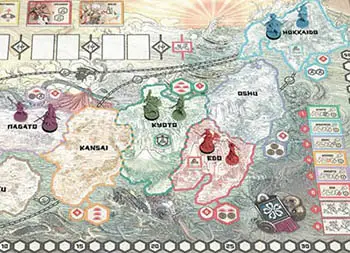
Example: For the Spring Season of this 4-player game, 6 War Province tokens are randomly picked.
Set Season Cards
If there are any Season cards left next to the board from the previous Season, discard these cards.
Take the Season deck for the current Season and place all its cards faceup next to board, within reach of all players.
Any identical cards may be placed on top of each other, staggered to show the number of piled cards. This will help players easily see all options available to them.
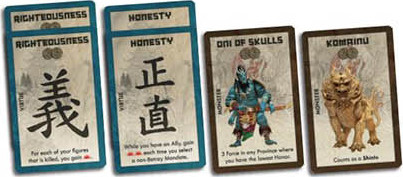
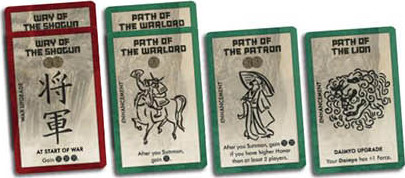
EXAMPLE: These are the Spring Season cards when using the Teapot Set.
Seasonal Income
Players should have no Coins at this point. They now each receive a number of Coins from the common pile equal to their Seasonal Income, as indicated on their Clan Screen.
Return Hostages
At the start of Summer, Autumn, and Winter, if any players have figures that they have Taken Hostage from other players (see page 22), they now return them to their owners. For each hostage figure a player returns, they get 1 extra Coin from the common pile.
II. Tea Ceremony
Once the Seasonal Setup is done, each Season starts with a Tea Ceremony in which players sit down and negotiate their Alliances for the Season. Any Alliances from a previous Season are unmade, and each player takes their Clan's Alliance token to propose new Alliances.
Being in an Alliance can be a powerful thing, granting you bonuses and some degree of safety (see next page). However, they may sometimes be restrictive or detrimental to your plans. It is very important to choose wisely who you want to Ally with, how far you're willing to take this Alliance, what you expect to gain from this Alliance, and even if you want to be in an Alliance at all this Season.
Alliances are forged between pairs of players, who must both be in agreement.
When an Alliance is formed, the two players join their Alliance tokens together, forming a complete circle, and place them in view of all players (we suggest the empty space at the top right of the board). Alliances last for the current Season (unless they are broken by a Betray Mandate), and no new Alliances can be made until the next Season.


Example: The LOTUS and TURTLE players decided to form an Alliance, while the DRAGONFLY and KOI players formed another.
Depending on the player count, the Tea Ceremony may end with several Alliances formed by pairs of players, and maybe one or more players not Allied with anybody. While an unallied player will miss the opportunity to get some bonuses, they can still explore the benefits of being a completely independent party.
Keep in mind that while Alliances may be mutually beneficial, Rising Sun is a competitive game where only one player will emerge as the winner in the end.
So, Alliances and deals are always meant to further your personal cause in the long run.
Negotiation Tip
The Tea Ceremony is an excellent opportunity to flex your negotiation skills. Forging the right Alliance can be quite powerful. You may want an Ally who has little interest in the Provinces you covet, or whose ability you want at your side. If the Alliance doesn't seem too beneficial for them, offering some Coins can always be persuasive.
Effects Of An Alliance
Allied players grant each other powerful bonuses from the Political Mandates they play during the Political Phase.
Allied players don't fight each other during the War Phase if they are the only ones in a Province. Victory goes automatically to the one with the highest Force there.
In a Battle involving two Allied players and other players, if one of the Allied players is victorious, they don't kill the figures of their Ally.
Allied players are still considered opponents for the purpose of Season card abilities and other effects.
If an Allied player plays the Betray Political Mandate, they immediately lose Honor and the Alliance is broken.
In the unlikely event that the game ends in a tie between Allied players, they share the victory.
III. Political Phase
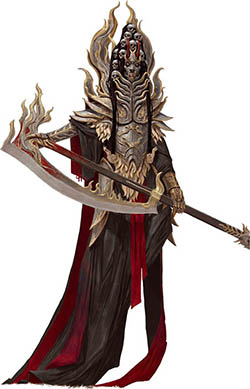
During the Political Phase, players will take turns selecting Political Mandates in order to prepare their Clans and position their forces according to their strategies.
As shown on the Political Track on the board, the Political Phase of each Season always follows this order:
- 3 Mandate Turns
- Kami Turn
- 2 Mandate Turns
- Kami Turn
- 2 Mandate Turns
- Kami Turn
- War Phase starts
Read here all the detailed information about the Karmi urns
IV. War Phase
During the War Phase, players Battle over several contested Provinces. Winning Battles grants players extra Victory Points, especially if they are able to conquer a variety of different Provinces. However, cunning players may reap many benefits from Battles they lose, if they master the art of war.
At the start of the War Phase, players should flip their POLITICAL/WAR tiles to their War side. Any War Upgrade Season cards a player has acquired should also be resolved at this point. Note that "At Start of War" Phase effects take place at the start of the War Phase of each Season, not at the start of each Battle.
Each Season, there will only be war in the Provinces marked with a War Number token, as determined by the War Province tokens drawn during the Seasonal Setup. As these tokens are randomized each Season, which Provinces are at war, and the order in which they are resolved, changes every Season.
Important: During the War Phase, players cannot freely give each other Coins or Ronin tokens as part of their negotiations.
Starting with the number 1 Province, and proceeding in ascending order, War is resolved in each Province, one at a time:
If nobody has any Force in the Province, nothing happens and its corresponding War Province token is simply discarded. If only 1 player has any Force in the Province , they simply take the corresponding War Province token and place it, faceup, next to their Clan screen.
If only 2 Allied players have Force in the Province , no Battle takes place. The player with the most Force in the Province simply takes the corresponding War Province token and places it, faceup, next to their Clan screen. As always, if there's a tie, the tied player with the highest Honor is considered to have the most Force in the Province.
If at least 2 players who are not Allied have Force in the Province , a Battle takes place to determine the winner.
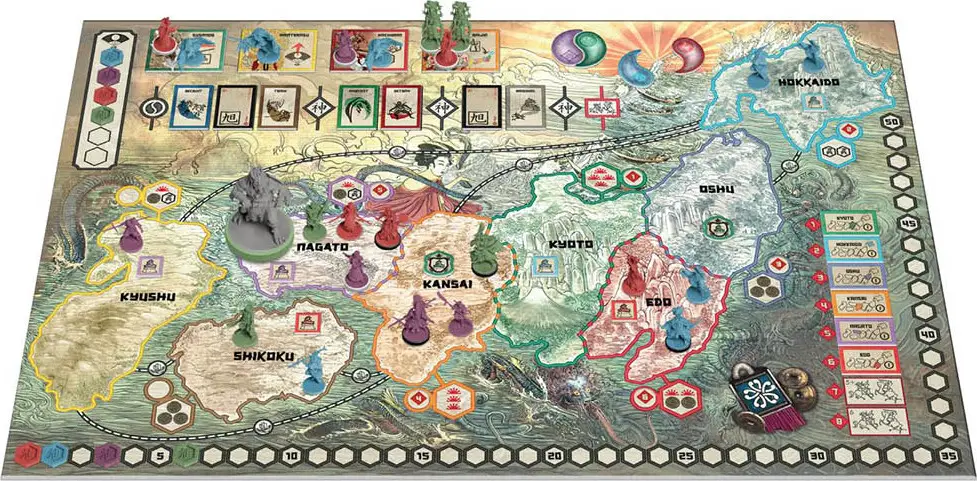
Example: As Spring nears its end, the War Phase takes place, resolving War in the indicated Provinces in order:
- Kyoto - As nobody has any Force there, its War Province token is discarded.
- Hokkaido - DRAGONFLY is the only one with Force there, so they take the War Province token.
- Oshu - Nobody has any figures there; however, the TURTLE 's special ability states their Strongholds count as 1 Force. The TURTLE takes the War Province token.
- Kansai - TURTLE and LOTUS each have 2 Force there. Since they are Allied, no Battle takes place. Since LOTUS has higher Honor, they take the War Province token.
- Nagato - TURTLE , LOTUS , and KOI have Force there. While TURTLE and LOTUS are Allied, KOI is not, so a Battle with take place between all 3! See the example in the next chapter.
- Edo - Both KOI and DRAGONFLY have Force there. Since they are no longer Allied, a Battle will take place here.
Resolving Battles

Battles only take place in Provinces where at least 2 players who are not Allied with each other have Force. The Battle involves all players who have any Force in that Province, even if they are Allied with each other. When a Battle takes place, the players involved will have a chance to use their Coins to try to gain certain War Advantages.
These may not only end up changing the total Force each player has in the Province (and thus shifting the Battle outcome), but may also grant other benefits to the players.
Before a Battle begins, all players must clearly display their Coins and Ronin tokens next to their Clan Screens. A player must truthfully answer how many Coins and Ronin tokens they have, if asked.
The Battle then begins! The involved players take all their Coins behind their Clan Screen and proceed to allocate them to the different War Advantage spots on the War tile. This is done simultaneously and in secret. Players may allocate any number of Coins to each spot (including zero), according to which Advantages they are trying to win. Any Coins the player doesn't wish to allocate to a War Advantage spot are placed behind the Screen, but below the War tile (make sure your opponents can't tell which spots you're placing Coins on, and whether you're placing any outside the War tile).
Once all players declare that they are done allocating their Coins, they all lift their Clan Screens simultaneously, revealing their bids.
Any Coins placed outside the War tile don't count for this Battle and are returned to that player's reserve. Players then proceed to compare the number of Coins allocated by each player in each of the War Advantage slots, starting from the leftmost War Advantage ( Seppuku ) and then proceeding to the right. Each War Advantage is won by the player who bid the most Coins on it. As always, if there's a tie, the tied player with the highest Honor is considered to have the most Coins in that War Advantage. If no players bid any Coins on a War Advantage, it is simply skipped and the next one is resolved.
Only the player who wins a War Advantage is allowed to execute it. However, the player may choose not to execute a War Advantage they won, in case they only wanted to win it in order to deprive another player of it.
War Advantages are resolved one by one, from left to right. Keep in mind that the resolution of one of the War Advantages may affect the outcome of the resolution of a following War Advantage.
Seppuku

There is more honor in ritualistic self-sacrifice, than a humiliating defeat at the hands of your enemy.
The player who wins Seppuku may choose to immediately kill all their figures in the Province. If they do so, they immediately gain 1 Victory Point for each of their figures killed this way and also gain Honor for each of their figures killed this way. (NOTE that this may change the Honor tiebreaker for the following War Advantages ).
If a player decides to perform Seppuku, they must kill all of their figures; they cannot choose to leave some in the Province. Note that the player is still in the Battle, even if they no longer have any figures in the Province.
Take Hostage

Taking a hostage may be enough to change the course of a battle and avoid further bloodshed.
The player who wins Take Hostage may choose to capture 1 figure in the Province belonging to another player (even from their Ally). The chosen figure is removed from the Province and placed next to the Clan Screen of the player who is Taking a Hostage. It will only be returned to its owner during the setup of the next Season. Note that the figure has not been killed, merely captured.
If the player Takes a Hostage, they also steal 1 Victory Point from the Clan that the captured figure belongs to. Move that Clan's marker back 1 slot on the Victory Point Track, and move forward 1 slot the marker of the Clan who Took the Hostage.
Note that if the targeted Clan doesn't have any Victory Points, the player doesn't get any Victory Points.
Important: Daimyo are immune to the Take Hostage effect and cannot be targeted by this War Advantage.
Hire Ronin

An army of Ronin mercenaries at your side may be the difference between victory and defeat,
if you have the coin to secure their loyalty.
The player who wins Hire Ronin may choose to add their Ronin tokens to their forces in the Province. For each Ronin token they have in reserve, they gain +1 Force to determine the outcome of the Battle. Keep in mind that these Ronin tokens are not spent when they are used in this way, and all of them will be available to be hired again in a following Battle.
If a player with no Ronin tokens wins Hire Ronin, they don't get to add any Force to their figures. However, they deprived other players from adding any Ronin tokens they may have to their forces.
Battle Outcome
The Battle must be concluded before Imperial Poets , the final War Advantage, may be resolved. At this point, players compare the total Force they currently have in the Province. This may have changed considerably from the situation at the start of the Battle, since some figures may have committed Seppuku , another may have been Taken Hostage , and a Clan may have Hired Ronin to bolster their forces.
The Clan with the most Force wins the Battle. They take the corresponding War Province token and place it faceup next to their Clan Screen. As always, if there's a tie, the tied player with the highest Honor is considered to have the most Force in the Province.
All the figures in the Province belonging to the players who lost the Battle are immediately killed. However, if one of the losers is Allied with the winning player, their figures are not killed.
Note: If, at the end of a Battle, no players have any Force left in the Province, the player with the highest Honor wins.
Imperial Poets
 Whether you win or lose a battle, true victory may be attained by the epic poems
Whether you win or lose a battle, true victory may be attained by the epic poemscomposed in honor of the fallen warriors .
The player who wins Imperial Poets gains a number of Victory Points equal to the total number of figures that were killed in the course of this Battle. It doesn't matter which player the figures belonged to, nor how they were killed (whether by Seppuku, by a Monster's ability, or at the conclusion of the Battle), all killed figures award Victory Points to the player who wins Imperial Poets. In order to more easily count them, keep killed figures separate from each player's reserves until Imperial Poets has been resolved.
War Reparations
The Battle is now over and all losing players discard all Coins they allocated on the War tile to the common pile.
The winning player, however, gives all Coins they allocated on their War tile to the losing players. The Coins are distributed equally among the losing players, who place them in their reserves to use in the following Battles. If the number of used Coins can't be distributed equally, the winning player decides which player(s) should get an extra Coin.
War is then resolved in the next Province, until all Provinces with a War Number token have been resolved, and the War Phase comes to an end.
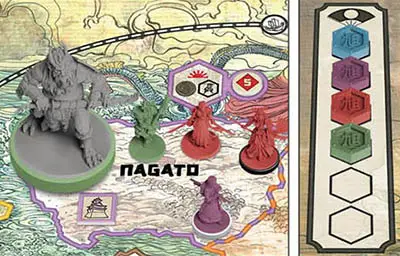
Example: A Battle must be resolved in Nagato between TURTLE , KOI , and LOTUS . TURTLE and LOTUS are Allied, but since KOI is also there, they must all fight. TURTLE has 4 Force there (1 from the Bushi and 3 from the Oni of Skulls, since TURTLE has the lowest Honor in the Province). They also have 4 Coins and 1 Ronin.
KOI has 2 Force there (1 from the Bushi and 1 from the Daimyo). They also have 8 Coins and 2 Ronin. LOTUS has 1 Force there, from the Shinto. They also have 6 Coins and 3 Ronin.
Negotiation Tip
Even in the chaos of a Battle, it is possible to negotiate. Even though players can't give each other Coins or Ronin during the War Phase, you can still make deals to better your chances. For example, allies can gang up on an enemy by agreeing to prioritize certain War Advantages and make sure they don't compete for the same ones. If their word can be trusted, that is...
The 3 players take their Coins and secretly allocate them on their War tile. Once they're done, the bids are revealed:
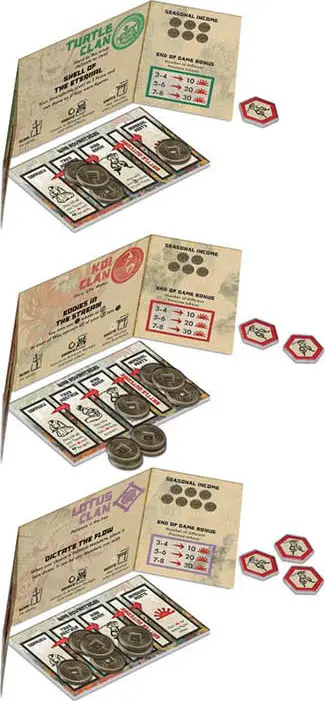
SEPPUKU - LOTUS wins Seppuku and decides to kill their own Shinto, gaining 1 VP and gaining Honor once.
TAKE HOSTAGE - TURTLE and LOTUS are tied with 3 Coins. Since LOTUS has higher Honor, they win. The player decides to take the TURTLE 's Oni of Skulls hostage (even though they're Allied).
HIRE RONIN - LOTUS beats KOI 2 Coins to 1 and is able to hire their 3 Ronin tokens, gaining 3 Force.
V. Seasonal Cleanup
With the War Phase over, there is some cleanup that must be performed before moving on to the next Season:
Discard Coins and Ronin - All Coins and Ronin tokens in players' reserves are returned to the common pile. They will need to rebuild their resources again next Season.
Return Shinto - All figures on the Shrine tiles are returned to their owners' reserves. They will need to send them worshipping again next Season. Note that all figures on the Map remain there from Season to Season.
Return Political Mandates - Take the Political Mandates that are on the board and shuffle them back with the deck of Political Mandates which should be close to the player to the left of the one who performed the last Mandate Turn this Season.
The next Season then begins with its Seasonal Setup step.
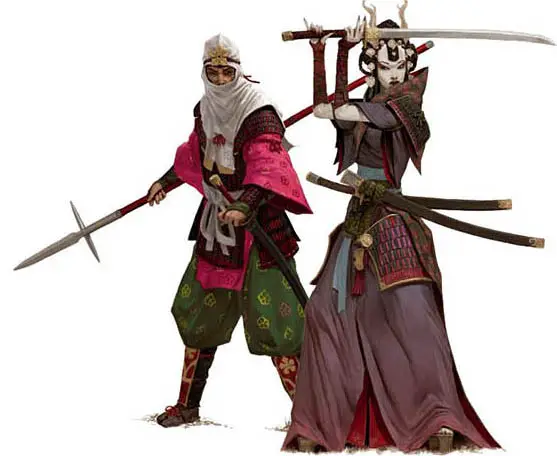
End of the Game: Winter Season
The start of the Winter Season signifies the end of the game. Peace falls over the land as it gets covered in white snow, and a new Emperor will rise under the power of the great Kami.
The only Season Setup step that must be executed during Winter is Return Hostages, in case players have any Season cards that trigger off of returning a hostage.
Players then may gain extra Victory Points for the following:
Winter Upgrades: These Season cards grant extra Victory Points depending on different criteria.
War Province Tokens: Each War Province token a player collected grants the number of Victory Points listed on it, depending on the Season in which it was won:
- Spring = 1 Victory Point
- Summer = 2 Victory Points
- Autumn = 3 Victory Points.
War Province Set Bonus: Players also get a Victory Point bonus according to the number of War Province tokens they accumulated of different Provinces. Having several tokens of the same Province doesn't count towards this bonus, only tokens of different Provinces count:
| Number Of Different War Province Tokens | Victory Point Bonus |
|---|---|
| 3-4 | 10 VP |
| 5-6 | 20 VP |
| 7-8 | 30 VP |
Move each player's Clan marker along the Victory Point track, adding all the extra Victory Points they manage to get. If a player goes beyond the 50 slot, move their marker back to the 1 slot and flip it upside down to remember to add 50 points to their score. Once all Victory Points are tallied, the player with the most points is declared the winner!
In case of a tie, the tied player with the highest Honor is declared the winner. In the very unlikely case that 2 Allied players are tied in first place, they share the victory.
Continue Reading

